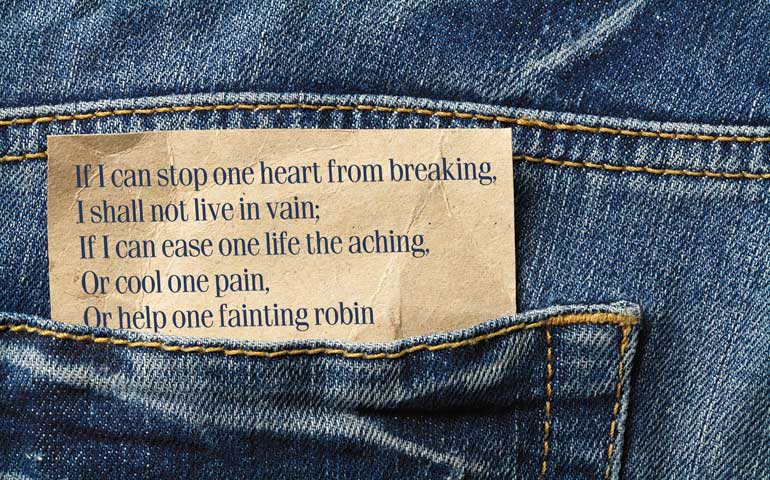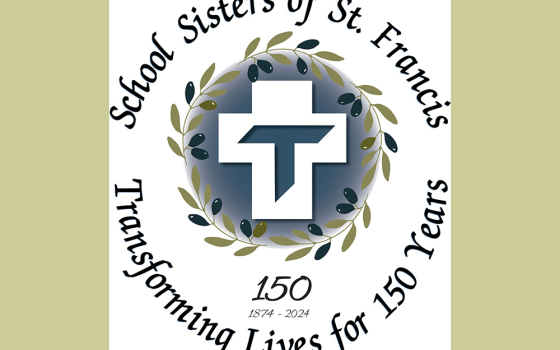
John Adams (1735-1826), the second president of our country, held this conviction: "You will never be alone with a poet in your pocket." Could it be that a good quantity of human loneliness is due to an absence of poetry, to the failure to put a poet in our pocket as we journey through this perilous life? And could it be that day in and day out, these wordsmiths, these versifiers, are whispering to us pearls of wisdom and phrases that contain meaning and wisdom and humor?
Every month, I put a poet in my pocket, lest I become too afflicted with loneliness or get lost in the cosmos. They, those noble poets, point the way to some modicum of truth, goodness and beauty. To them I owe a bundle of gratitude.
My January poet was the Belle of Amherst, Emily Dickinson. In her "If I can stop one heart from breaking," we find a whole philosophy (theology, if you will) of life: being for others. Our lives will not be in vain if we offer that cup of cold water, offer others consolation, reach out to the hurting.
In February, Denise Levertov appeared with her poem "Primary Wonder." She confesses up front that too often she forgets the mystery of God's providential presence, distracted by so many problems and worldly activities. But then when the quiet comes, the mystery reemerges, and she is filled with wonder and awe at what she sees with the eye of her soul.
Gerard Manley Hopkins is my March mentor. His poem "God's Grandeur" and that powerful phrase -- "There lives the dearest freshness deep down things" -- is one of the greatest lines in all of literature. And, of course, that deepest deep down thing is love, the heart of reality, the presence and gift of the brooding Holy Spirit.
April always brings e.e. cummings to mind, and my second most favorite phrase in all of poetry: "the sweet small clumsy feet of April came/into the ragged meadow of my soul." For most of life, I never knew that April had feet or that there was a ragged meadow in my soul. Now I know and rejoice in the fact.
In the merry month of May, one can do no better than to invite Mary Oliver over for tea and have her recite "The Summer Day." Before leaving, she will put a question upon you that is not rhetorical, a question about what you are planning to do with your life, so wild and so precious.
Then comes summer, a time to take a break from our busyness to smell the flowers and enjoy long, lazy summer days. Langston Hughes will tell you, in "A Negro Speaks of Rivers," how the Euphrates, Congo, Nile and great Mississippi deepened his soul. Carmelite Sr. Jessica Powers assures us in her "The House at Rest" that we gain our freedom through a virtuous life, enabling us to find blessedness and peace by way of good habits. Then, Dorothy Donnelly explains the magic of salt and of words, bringing savor and wit to our troubled human condition. "Domestic Magic" is a real treat.
September's poet, R.S. Thomas, takes us on a tour to the moor. If we are quiet, we will experience God's presence in the wind and clean colors of that landscape. "The Moor" calls us to reverence and stillness. It also offers us unexpected graces, bread breaking and crumbling over us.
Our soul longs for peace. Where is it to be found? Wendell Berry, in his "The Peace of Wild Things," discovers it in God's creation, in the forest and ponds and stars. Autumn is a season rich in colors and beauty; autumn is a time to reconnect with nature and all the wild things of creation. We cannot afford to go through October without some verse.
Then there are the darkening days of November. Too easily, we become lost and disoriented on this human journey. Is there some secret to help us find our way? David Wagoner speaks powerfully of "standing still," of letting ourselves be found rather than hurrying and scurrying around in frantic circles. The secret is in the here and in the now. "Lost" is a poem to pocket.
Every December, I hurry back to my former teacher, Fr. Gordon Gilsdorf, who not only instructed me on how to write but also how to read poetry. More, he himself put pen to paper and wrote a poem "Lyrics for the Christian." The last stanza reads:
I searched
God's lexicon
To fathom "Bethlehem"
And "Calvary." It simply said:
See "Love."
A poem in the pocket means we will be accompanied wherever we go.
[Bishop Robert Morneau served as an auxiliary bishop of the Green Bay, Wis., diocese from 1978 to his retirement in 2013. He is the author of many books of poetry, including The Color of Gratitude.]



